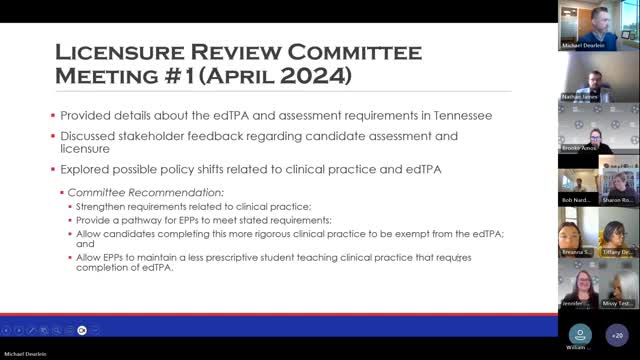Tennessee board committee signals move to drop edTPA if clinical practice is strengthened
Get AI-powered insights, summaries, and transcripts
Subscribe
Summary
A State Board of Education committee discussed removing the edTPA assessment for candidates who complete a strengthened, department‑approved clinical internship or student teaching program and outlined related proposals on mentor tools, internship structure and observation frequency.
At a meeting of a State Board committee (date not specified), members and Department of Education staff said the group is moving toward removing the edTPA performance assessment for candidates who complete a strengthened, state‑approved clinical practice pathway. Michael (meeting facilitator) framed the recommendation as conditional: “candidates completing this more rigorous clinical practice do not have to complete the edTPA assessment,” he said.
The recommendation grew from a review of educator preparation that found the edTPA can pose a barrier for candidates. Committee members and Department staff said the board should raise the minimum requirements for clinical practice so the state can rely on program quality rather than a separate performance test.
Committee members discussed specific policy proposals to back a change. Jennifer Nelson, senior director of educator preparation for the Tennessee Department of Education, described a proposed rule change already presented to the board: “Beginning on July 1, 2026, clinical mentors supervising candidates completing an internship clinical practice, that is the year long clinical practice, as defined in educator preparation policy 5.504 shall use an observation tool approved by the department.” That language was presented on first reading to the board in August and department staff said it will return for final reading in November, subject to tweaks.
Members debated how to define an internship that could substitute for the edTPA. The draft proposal would require an internship that spans a full academic year, with candidates teaching part time in the first half of the year and full time in the second; field experiences would be completed before the internship begins. The group also discussed allowing coursework during the first half of an internship but not during the second half so candidates can focus on full‑time teaching responsibilities later in the year. Participants noted the state’s existing student‑teaching pathway remains a 15‑week minimum under current rules.
The committee discussed evaluation and oversight expectations if the state waives edTPA. The draft language would require clinical mentors and program supervisors to “formally evaluate candidates using a department‑approved evaluation tool a minimum of five times during the clinical practice.” Several prep programs and district representatives pushed back on the wording and the number, arguing for clearer pacing, training for mentors and alignment with local observational systems (for example, TEAM) rather than a single prescriptive count. Martha Moore, senior director of educator effectiveness for the department, explained the tradeoffs between the terms observe and evaluate and noted districts use different frequency and duration standards for novice teacher observations.
Participants also discussed removing the rigid requirement that clinical practice occur in two different school buildings. The committee proposed replacing the two‑school rule with a requirement that clinical experiences expose candidates to a variety of student populations and diverse learning needs; that change would apply to field experiences and clinical practice and would allow programs flexibility in how they meet the intent of diversity exposure.
Committee members raised operational concerns that would follow any policy change: mentor availability and training, the administrative burden on educator preparation providers (EPPs) to update program approvals, and funding to compensate mentors. Several EPP representatives warned that some programs would need to resubmit multiple program approval documents if the state reclassifies clinical practice pathways. Attendees also referenced Public Chapter 284 — a state law that allows temporary teaching licenses in some circumstances — as part of the broader licensing context.
Next steps: department staff will collect additional feedback between first and final readings and the committee’s recommendations will be transmitted to the board’s executive director. The rule language about an approved observation tool is scheduled for final reading in November; any larger policy changes would be considered again ahead of a final board action in February. Committee members were invited to share further comments with staff and to bring stakeholder feedback to the department prior to the next series of reviews.
The primary items discussed were recommendations and policy drafting; no formal board vote to remove edTPA occurred at the meeting.
